FAIRFAX, Va. (Army News Service, March 11, 2011) -- Launched just eight months ago, Veterans Moving Forward vows to provide service dogs, at no cost, to veterans with physical and mental health challenges, including those suffering from post-traumatic stress disorder and traumatic brain injuries.
"We want to make a meaningful difference in the lives of our veterans by increasing their safety and independence within their environment," said Karen Jeffries, founder of Veterans Moving Forward, or VMF, and a service-disabled veteran herself. She retired as a commander from the Navy nine years ago.
"We differ from similar services that only focus on vets with PTSD or those from certain wars. I don't care if somebody lost their leg because of diabetes or they lost a leg because of an IED (improvised explosive device) explosion. If they're a wounded veteran, we will engage with their health care team, to analyze their needs and see if one of our dogs can help them," she said.
'FOR VETERANS, BY VETERANS'
The organization not only provides skilled companion dogs to veterans, it also employs veterans.
"Our motto and our goal is 'for veterans, with veterans and by veterans,'" said Jeffries.
One of her first acts was asking retired Army Col. Gordon Sumner as her secretary of the board of directors, who, along with his board of other retired military members and senior civilian leaders, works on marketing and funding.
She also hired Kristen Ness, who is a step or two above an obedience trainer, Jeffries said. Ness comes to VMF after many years of training dogs for wounded warriors at the U.S. Marine base at Kanneohe, Hickam Air Force Base and Hawaii Fi-Do, an organization dedicated to providing quality-trained assistance dogs to the disabled community of Hawaii.
Beginning in a few weeks, Chris Goehner, a service-disabled veteran, will relocate to the nation's capital from Washington state after earning his bachelor's degree.
"Chris, who has a service dog raised by prisoners, believes in our program so much that he will be our advocate by making speeches and attending fundraisers. He's already been interviewed by CNN," Jeffries said.
PTSD THERAPY
Since July of last year, VMF, which now has eight dogs, has partnered with orthopedic clinics, private practice, practitioner's health care, psychologists and licensed clinical social workers, as well as visitation programs.
"We have helped dozens of vets in our comfort and therapy program, but I have not yet placed a dog with a vet that has been trained by my organization," Jeffries said, adding that the training program for this to happen can take up to two years to complete.
Jeffries proudly introduced some of the teams providing this service.
"So this dog, Edwin, and Wendy Luterek, a former physical therapist, go with us to Bethesda and provide a 15- or 20-minute bedside visit with a vet and their family.
"This dog over here, Iden, with Karen Czekanski, a former nurse, has done brilliant work in private practice for a psychologist who specializes in PTSD. The doctor told us he has dealt with disabled vets five or six times, and she's able to get more out of the veterans in their recovery process and helping them through their PTSD when one of our dogs sits by their side.
"She sits in a 45- or 55-minute therapy session and enables and assists in the treatment process. So Iden is a Therapy Dog. Her talent is to be lovable and lean up against a guy or gal that's got PTSD and is working through it with a psychologist," Jeffries said.
MILITARY MEDICAL CENTERS
Currently, this not-for-profit group has been visiting patients at Walter Reed Army Medical Center and at Bethesda Naval Medical Center on the wards and is working with the Uniformed Services University of Health Sciences, with nurses to conduct a study on the therapeutic value of dogs.
Soon, their mission will hopefully move to Fort Belvoir's DeWitt Hospital, said Jeffries.
Her passion for this special relationship between a disabled person and a loving dog came to her over 30 years ago when she was involved with the Center for Independent Living, because one of her friends was a quadriplegic.
"But after I got out of the Navy and in between jobs, I took on the challenge of raising a puppy for another organization and that organization took the puppy I raised for 18 months, trained him a little further and placed him with a woman who is visually impaired, as well as mobility-challenged in a wheelchair.
She took her dog everywhere, but when she went to the dentist something extraordinary happened.
"My dentist had patients with PTSD or phobias. I watched that little puppy work miracles as he helped people with white knuckles and scared to death, relax. And my dentist would tell me to bring him back because he didn't have to give as many medications," she said.
BACK FROM THE BRINK
Jeffries feels blessed to have served her country and now to be able to give back to the vets, but one recent visit to Bethesda Naval Hospital in Maryland brought tears to her eyes when remembering.
"A couple of weeks ago at Bethesda, we visited a young man who was a triple amputee. His mom said she wanted us to come into her son's room. The man had not spoken in 75 days. But with his one limb he reached out to touch that dog and his first word was the dog's name. His mother told us that her son was ready for death until he met our dog.
"The dogs really do provide motivation and help us forget about pain for a few moments," Jeffries said.
"Our service is getting more mainstream, but it's still an education process. The national regulations are not there, yet, which is a challenge for separating the legitimate organizations from the amateurs.
ACCREDITATION
"But there are national standards for visitation programs and for many hospitals that will insist that not only do you provide proof of insurance, but proof of training and proof of your evaluation," she said.
To become a volunteer team member with a dog, Jeffries suggests getting basic training first and then completing the American Kennel Club's Canine Good Citizen test. This is a two-part program that stresses responsible pet ownership for owners and basic good manners for dogs.
At the top of her list for evaluation is Delta Society of Bellevue, Wash. This group screens volunteers and their pets so they can visit people in hospitals, nursing homes, hospices and physical-therapy centers and schools, to name a few.
They are also a research foundation, which demonstrates that when animals are around, people's blood pressure goes down, stress and anxiety levels are reduced, people feel less lonely and less depressed, and they tend to be more social and community oriented.
Other groups that perform evaluation are Assistant Dog International and Therapy Dog International.
WIDE RANGE OF SERVICES
Because the training program can take up to two years, her dogs and the volunteers who train the dogs -- at home and with Kristen Ness at Pender Veterinary Centre in Fairfax where co-owner Mark Johnson has donated the space -- are all on track to provide specialized types of service:
- Comfort dogs provide opportunities for motivational, educational, recreational and/ or therapeutic benefits to enhance quality of life for veterans.
- Therapy dogs participate in animal-assisted therapy with specific goals, objectives and progress, documented by health-care professionals such as: occupation therapists; physical therapists; certified therapeutic recreation specialists; psychologists for post-traumatic stress disorder, traumatic brain injury, socialization, mental stimulation and motivation to participate in therapy and recovery; and speech therapists.
- Facility dogs are assigned duty to work at the side of a professional caregiver, health-care practitioner or physical or occupation therapist to engage veterans in activities.
- Assistance/Service dogs stay with a veteran for up to seven years and can help to retrieve dropped items, open and close doors, turn on or off the light switches, carry items and alert in an emergency.
MIXING WORK WITH PLAY
"I work with my dog, Edwin, for about 15 minutes, three times a day," said Luterek.
"Before dinner, before breakfast and in the afternoon, I go through the basics with him: sit, stand, stay or down, roll, seek, that kind of stuff. And now that he's getting older, I do some tugging work with him and I'll hide a toy and ask him to go find it. If the phone rings, he'll find it and bring it to me," she said.
Edwin can also sense when someone in a room is having a problem or is not healthy.
"He'll just go over and sit next to the person. It really is amazing to watch," Luterek said.
Some other organizations providing help, either directly or indirectly, for veterans are Psychiatric Service Dog Society in Arlington, Va.; Paws for Purple Hearts; Canine Companions for Independence; America's VetDogs; and NEADS Canines for Combat Veterans.
To make a donation to Veterans Moving Forward or to learn more, visit www.vetsfwd.org.
Related Links:
To conserve the 'biting' strength
Related story: Paws for Purple Hearts helping with PTSD
Therapy dogs all about the love
Man's best friend helps Soldiers cope with experiences
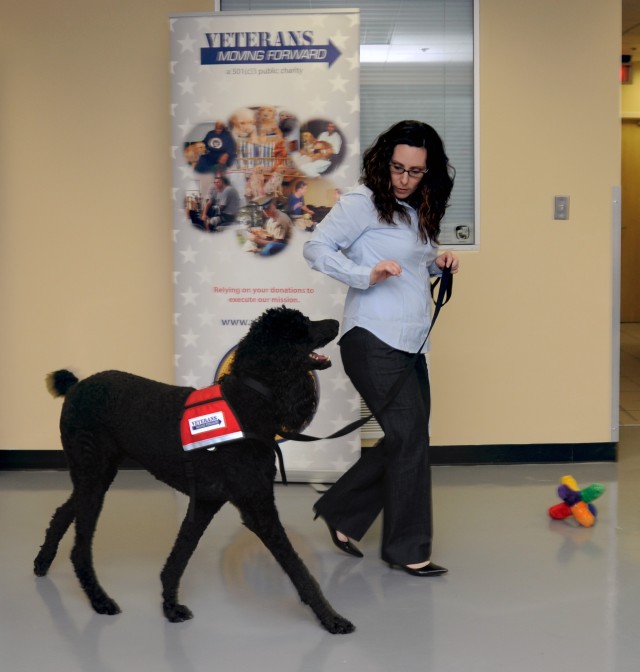
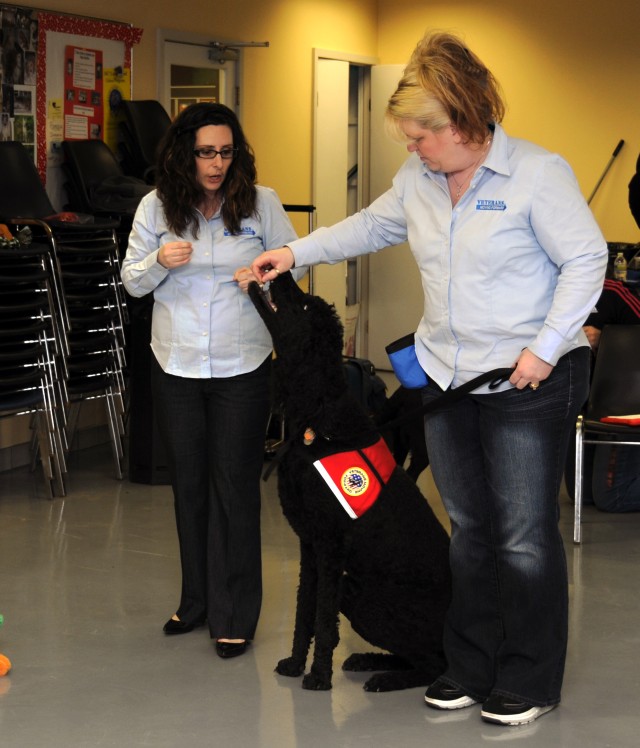
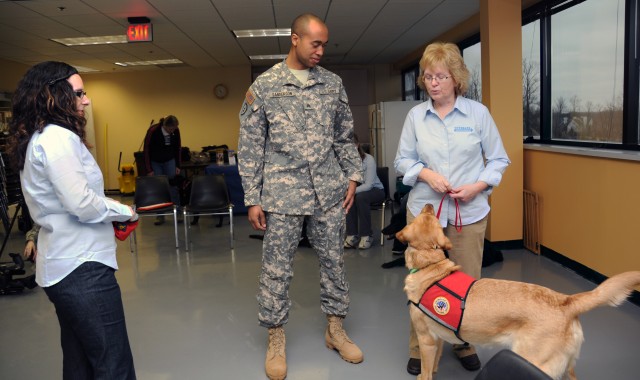



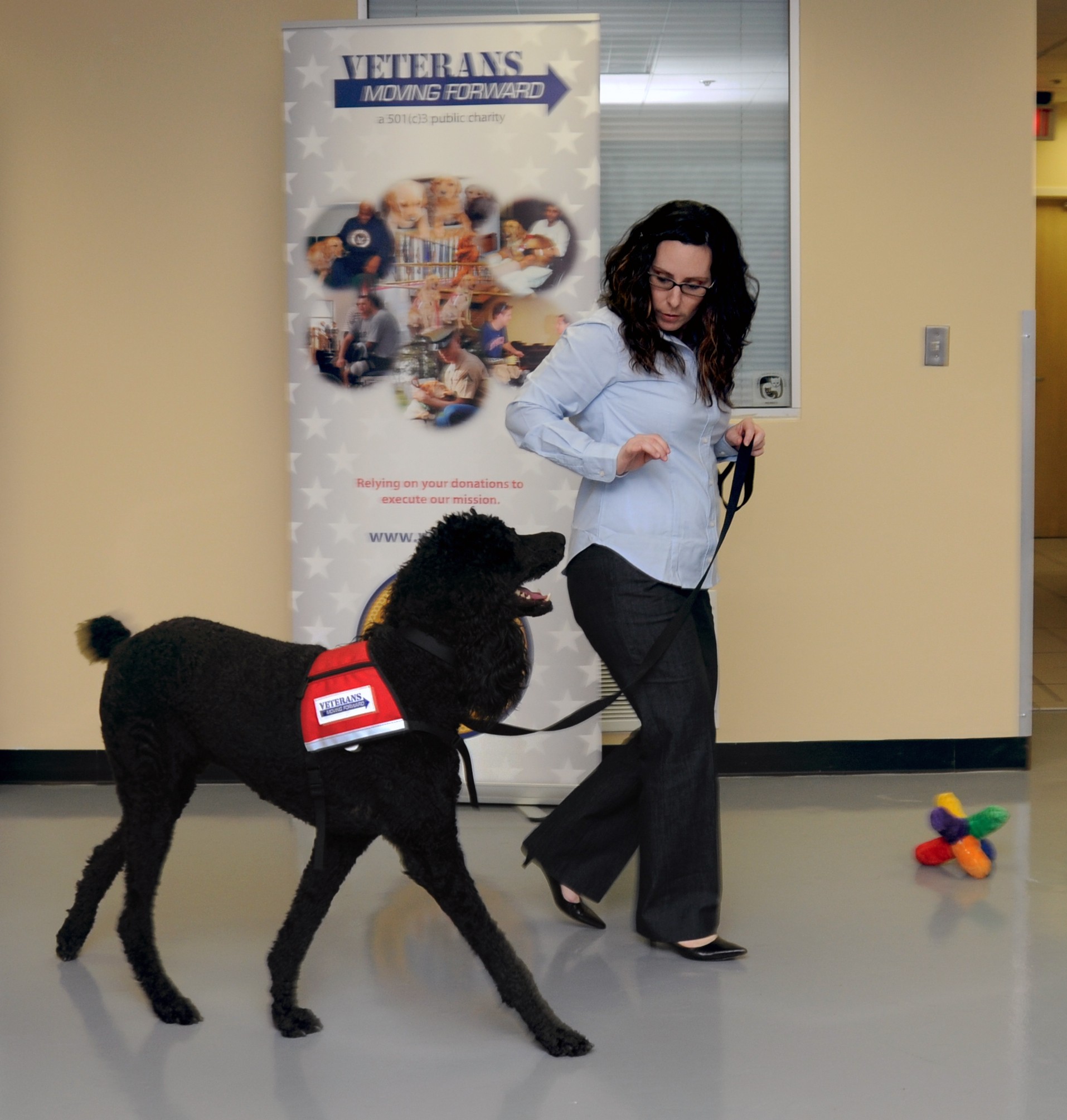


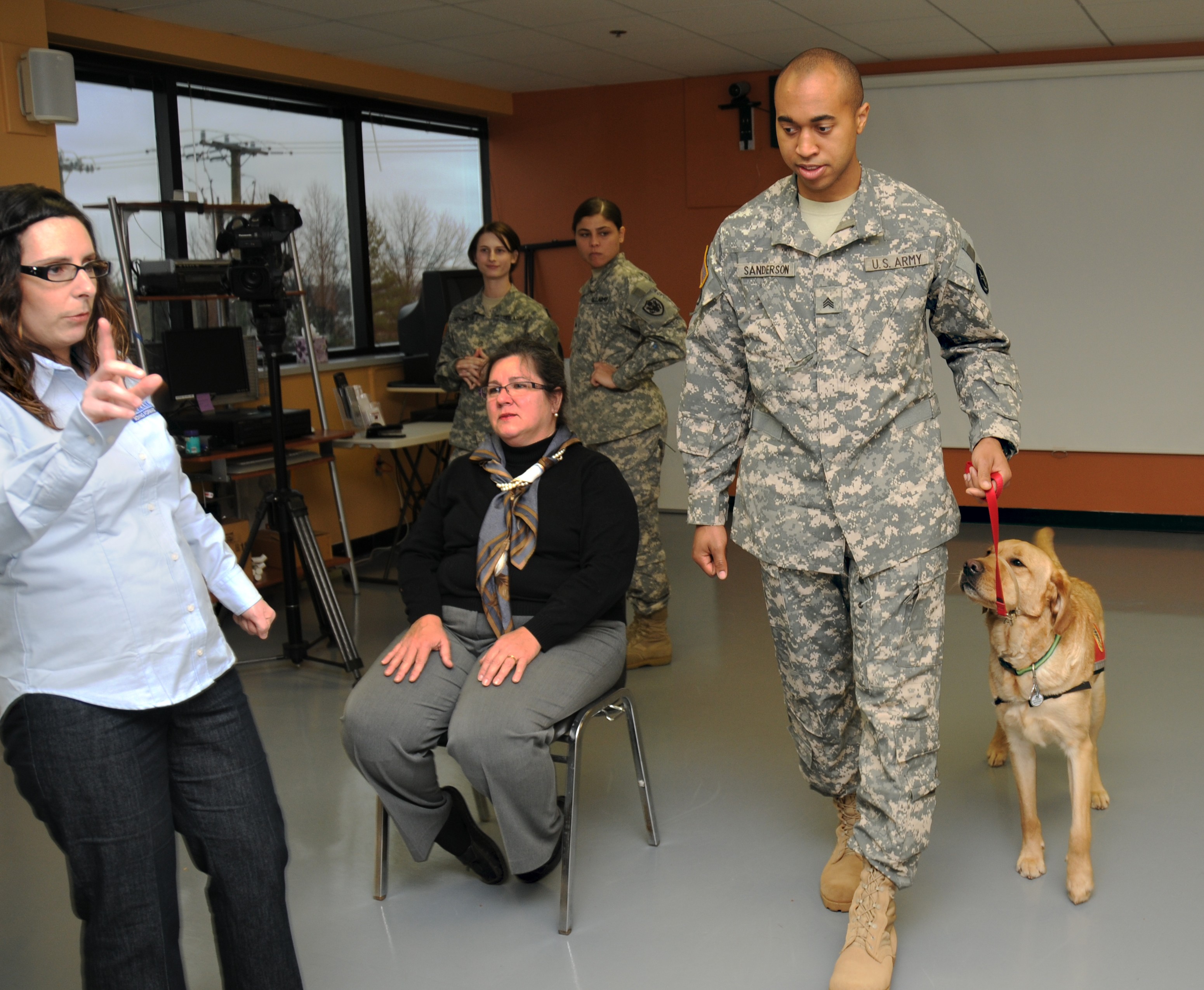


Social Sharing